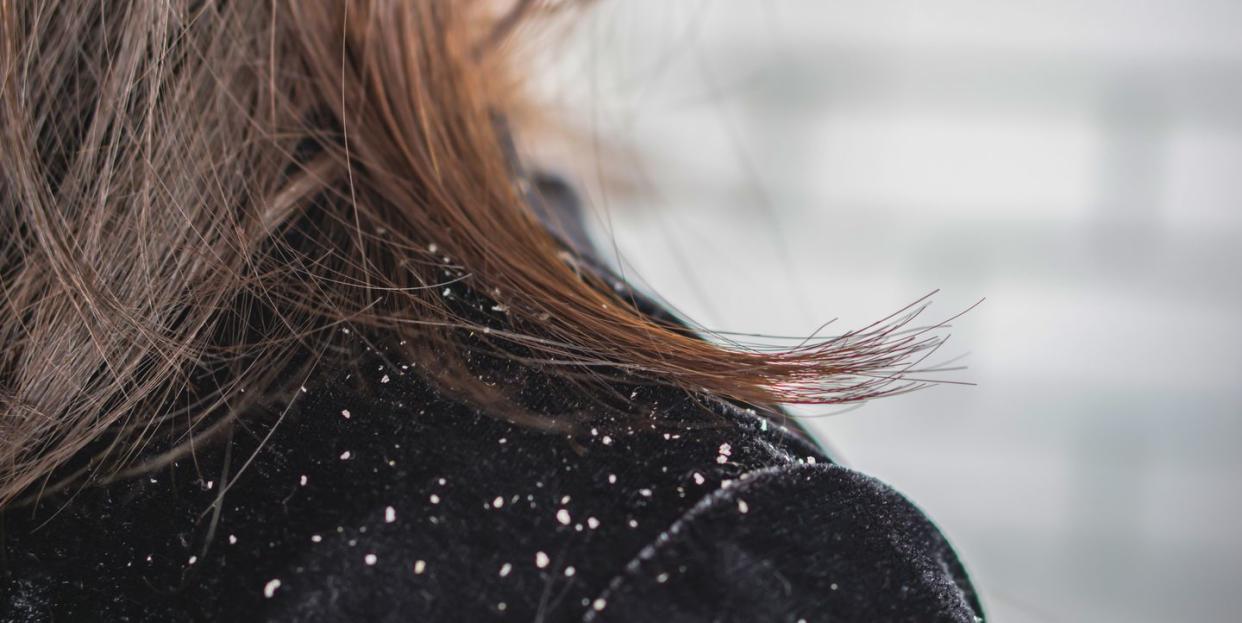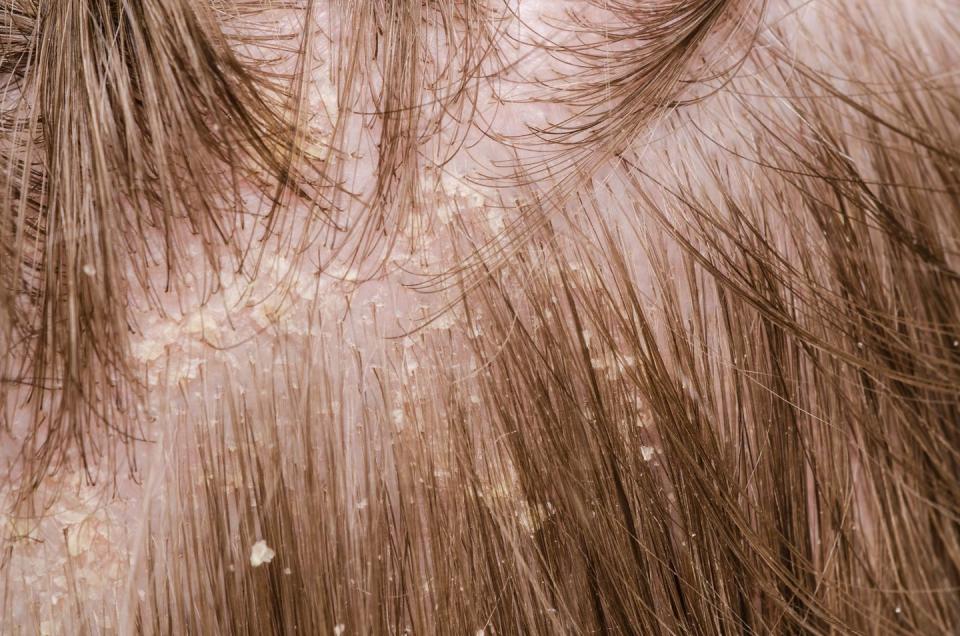Think You Have Stubborn Dandruff? Those Flakes Could Be Something Completely Different

"Hearst Magazines and Yahoo may earn commission or revenue on some items through these links."
If you have a constant snow flurry of flakes on your shoulders, you may have assumed that it’s dandruff. But dry scalp, which is something completely different, could also be the culprit. It's important to know what's causing your irritation because treatment is completely different depending on which you have.
Just looking at your scalp won't lead to many answers, so we reached out to Mona Gohara, MD, associate clinical professor of dermatology at Yale School of Medicine, to learn how you can spot the difference and the proper course of action to take.
What is dandruff?
We all shed tiny skin cells from our scalps, but with dandruff, those cells build up and clump together, and are much more noticeable. Dandruff can be an embarrassing condition to have, as well as uncomfortably itchy. But it’s very common: Some sources say as many as half the population of Americans suffer from it. Dr. Gohara explains that dandruff is a mild form of seborrheic dermatitis, stemming from an imbalance of the scalp’s microbiome. It’s non-contagious and can also affect the eyebrows or other facial hair, and it can be difficult to treat, according to the Mayo Clinic. Though it can be annoying, it’s not a serious condition that requires medical treatment, says the American Academy of Dermatology.
What is dry scalp?
“Dry scalp is a symptom, rather than a condition,” says Dr. Gohara. “It’s like when you have a fever — it could be a symptom of many things — same thing with dry scalp. There are a whole lot of reasons why someone could have a scalp that’s dry.” One way to think about it, she adds: “Dandruff is coming from inside the body, and with dry scalp there’s something on the outside that’s causing it to happen.”
Dandruff causes
Science hasn’t completely settled on what causes dandruff — but it’s definitely not brought on by a lack of hygiene, as previously thought. “Some people think it can be exacerbated by stress—the rise in the hormone cortisol that happens when the body’s under stress can contribute to inflammation—and some people think it can be seasonal. Others think it's just genetic. So there are different theories — nothing proven, but that's what we theorize.” There are two things, however, that the science shows are most likely associated with dandruff, says Dr. Gohara:
An imbalance of yeast. “We all have a type of yeast in our bodies called Malassezia,” explains Dr. Gohara. “It’s a part of our body’s normal microbiome. When there’s an overgrowth of it, it can cause dandruff or seborrhea.” According to research published in the journal PLoS Pathogens, people with dandruff may have a skin barrier defect that’s aggravated by Malassezia.
A too-oily scalp. Are you seeing greasy hair or an oily scalp? Those two things are signs of increased production of sebum — an oily substance that helps keep the skin from drying out—on the scalp. Recent research suggests that a certain component of sebum called squalene may play in role in dandruff by increasing inflammation.
One other theory is that dandruff is caused by an imbalance of bacteria. A 2016 study out of China published in Scientific Reports found that two bacteria commonly found on the scalp could be a cause of dandruff, when there’s too much of one type and not enough of the other. The researchers concluded that in the future, treatments for dandruff could focus on adjusting the balance of these bacteria.
Dry scalp causes
The scalp becomes dry when, for one reason or another, it has trouble producing and holding in moisture, or doesn’t naturally produce enough sebum. This can lead to fine flakes. When a patient comes to Dr. Gohara with this issue, she says, “First, I would try to understand if there’s a medical condition that’s causing it—whether it’s, say, psoriasis or eczema. If not, I’d ask them about their skincare routine and make sure that they’re using the right types of cleansers, to see if their shampoo is stripping their scalp. You know, scalp is skin, so just like you wouldn’t take a harsh cleanser to your face, you shouldn’t use some random sulfate-based shampoo, because that’s going to do dry out your scalp in the same way. And then I’d do a deep dive, and I’d ask them how frequently they’re washing their hair — is it too much? Do they condition their hair? Are they washing the products out — or is the problem a build-up of product? Because if it’s not something like psoriasis, eczema or dandruff, then it’s most likely something they're doing — or not doing — to their scalp that’s causing it.”

Symptoms of dandruff and dry scalp
Though both dandruff and dry scalp cause flaking, those flakes can look different. With dandruff, the flakes tend to be larger and yellow-tinged. With dry scalp, the flakes are likely to be whiter and smaller, and, says Dr. Gohara, since it’s not caused by an overabundance of oil, the flakes are not adherent. "Sometimes with dandruff, the flakes can adhere to the hair and such, and they’re more waxy, as opposed to the snowflake kind of flakes you see with dry scalp.”
Dandruff and dry scalp treatments
There are specific over-the-counter shampoos that are designed to treat dandruff, according to the American Academy of Dermatology. They contain different ingredients, including salicylic acid, zinc pyrithione, coal tar and selenium sulfide. And there’s also an OTC anti-yeast shampoo that’s used to treat dandruff, says Dr. Gohara. Prescription options are also available through your dermatologist.
Some sources suggest trying tea tree oil, and there is a study to back this up — however, the study that is usually cited is over 20 years old. “Tea tree oil does have antibacterial properties,” says Dr. Gohara, but she adds that there are more effective ingredients, like those mentioned above.
For dry scalp, look for shampoos that are less irritating and more moisturizing. “You could try using sulfate-free cleansers, or those with glycerin or hyaluronic acid, or something hydrating like hydrating oils. You can also try washing your hair less often—but really, it depends on why you have a dry scalp. I wouldn’t want somebody who has psoriasis to wash their hair less often.”
And you shouldn't be using dandruff shampoos for a dry scalp! “If dandruff is not the issue, it’s not going to help,” says Dr. Gohara. “And sometimes anti-dandruff shampoos can strip the oil, which would be counterproductive with dry scalp.”
When to see a doctor
“First of all, if you have any pain or see any signs of inflammation, like redness or rashes, you should see a doctor,” says Dr. Gohara. “Or if it’s not going away — if it’s a persistent problem, and you haven’t figured out what it is or what’s causing it, and you need a doctor’s help in figuring it out. If the problem isn’t responding to the solutions you’re trying, then there may be another reason. There are a lot of reasons for having flakes, including psoriasis and eczema, and you should see your doctor to find out what’s going on.”
You Might Also Like

